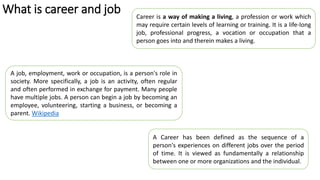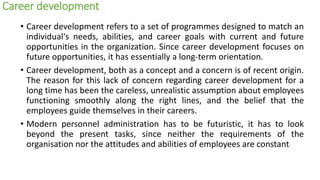CPD.pptx
- 1. Course Tile _Career Planning and Development_ HRM 1105 Course Instructor Md.Mobarak Karim Senior Lecturer World School of Business World University of Bangladesh 01724027476/01568321449 karim6@business.wub.edu.bd Introduction to career planning and development
- 2. Lesson outlines Definition of career and job What is career planning Basic concept Career development and its nature
- 3. Learning outcomes After studying this lesson you will be able to_ Know the basic concept of job and career Understand the career planning Explain what is career development
- 4. What is career and job Career is a way of making a living, a profession or work which may require certain levels of learning or training. It is a life-long job, professional progress, a vocation or occupation that a person goes into and therein makes a living. A job, employment, work or occupation, is a person's role in society. More specifically, a job is an activity, often regular and often performed in exchange for payment. Many people have multiple jobs. A person can begin a job by becoming an employee, volunteering, starting a business, or becoming a parent. Wikipedia A Career has been defined as the sequence of a person's experiences on different jobs over the period of time. It is viewed as fundamentally a relationship between one or more organizations and the individual.
- 5. Career • Edwin B. Flippo,“ A career is a sequence of separate but related work activities that provide continuity, order and meaning to a person’s life” . • According to Garry Dessler, “The occupational positions a person has had over many years”. • Many of today's employees have high expectations about their jobs. There has been a general increase in the concern of the quality of life. Workers expect more from their jobs than just income. • A further impetus to career planning is the need for organizations to make the best possible use of their most valuable resources the people in a time of rapid technological growth and change.
- 6. Career planning Career Planning is a relatively new personnel function. Established programs on Career Planning are still rare except in larger or more progressive organizations. Career Planning aims at identifying personal skills, interest, knowledge and other features; and establishes specific plans to attain specific goals
- 7. Career planning • Career Planning aims at matching individual potential for promotion and individual aspirations with organizational needs and opportunities. Career Planning is making sure that the organization has the right people with the right skills at the right time. In particular it indicates what training and development would be necessary for advancing in the career altering the career path or staying in the current position. Its focus is on future needs and opportunities and removal of stagnation, obsolescence, dissatisfaction of the employee.
- 8. Career development • Career development refers to a set of programmes designed to match an individual's needs, abilities, and career goals with current and future opportunities in the organization. Since career development focuses on future opportunities, it has essentially a long-term orientation. • Career development, both as a concept and a concern is of recent origin. The reason for this lack of concern regarding career development for a long time has been the careless, unrealistic assumption about employees functioning smoothly along the right lines, and the belief that the employees guide themselves in their careers. • Modern personnel administration has to be futuristic, it has to look beyond the present tasks, since neither the requirements of the organisation nor the attitudes and abilities of employees are constant
- 9. Career development • Career development refers to set of programs designed to match an individual’s needs, abilities, and career goals with current and future opportunities in the organization. Where career plan sets career path for an employee, career development ensures that the employee is well developed before he or she moves up the next higher ladder in the hierarchy. • Career development refers to a set of programmes designed to match an individual’s needs, abilities, and career goals with current and future opportunities in the organization. Since career development focuses on future opportunities, it has essentially a long-term orientation. • Career development differs from employee development through training and development in terms of time perspective. While career development has long-term orientation covering the entire work-life of an individual, employee development has immediate and intermediate-term orientation.









